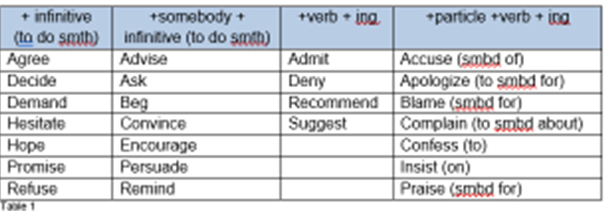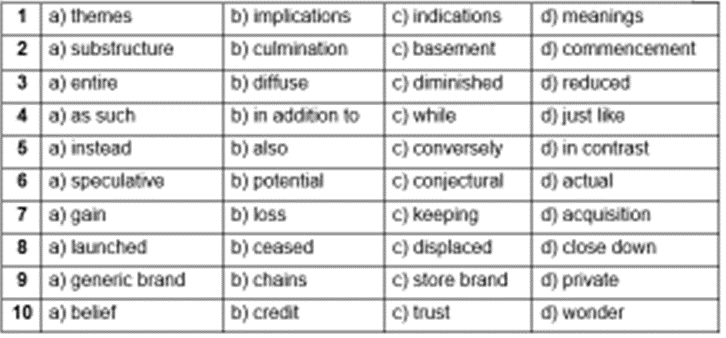I. What is reporting?
In previous levels you learned that reporting is to say what someone else has said, written or done. It is commonly known as Reported Speech or Indirect Speech.
II. Common reporting verbs
III. Other reporting verbs
However, there are many other verbs that help you report information with a specific shade of meaning or intention like suggest, promise, remind, admit, refuse, deny. Look at examples A and B.
- “You should start a workout plan”, the doctor told me.
In this example, the doctor’s intention is giving a piece of advice or suggestion. So, you can report this by saying:
The doctor suggested starting a workout plan.
- “Don’t worry. I won’t tell anyone about your pregnancy”, Susan told me.
In this other example, Susan’s intention is to keep a secret, so she’s making a promise. Then, this piece of information can be reported as follows:
Susan promised not to tell anyone about my pregnancy.
IV. Grammar structure
- The reporting verbs follow different rules. To help you understand how to correctly place them in a sentence, we have organized them into four main categories. There are many more, but in this unit, we would like you to work with the ones in the next chart.

V. Intention and meaning.
VI. CONSOLIDATION
VII. EXERCISE I
Read the sentences carefully and choose the correct verb pair from the box. Conjugate the verbs according to the reporting verbs pattern.

VIII. PRACTICE I.
Read the text below and choose the correct word for each space. For each statement, mark the correct letter a, b c or d.
What is sustainable marketing?


IX READING TEXT
Women, culture, and leadership
I Melissa Barrios worked for a multinational company as a successful project manager in Argentina and was transferred to manage a team in Berlin. She recognized that she was excited about her new role, but soon realized that managing her new team would be a challenge.

II Despite their friendliness, Melissa acknowledged that she didn't feel respected as a leader. Her new staff would question her proposals openly in meetings, and when she gave them instructions on how to carry out a task, they would often go about it in their own way without checking with her. When she announced her decisions on the project, they would continue giving their opinions as if it was still up for discussion.
III After weeks of frustration, Melissa talked to the German manager about the issues she was facing with her team. The manager simply asked her if she felt her team was still performing, and what she thought would help her better collaborate with her team members. Melissa accepted she found her manager vague and didn't feel as if he was managing the situation satisfactorily.
IV What Melissa was experiencing was a cultural clash in expectations. She was used to a more hierarchical framework where the team leader and manager took control and gave specific instructions on how things were to be done. This more directive management style worked well for her and her team in Argentina; however, did not transfer well to her new team in Germany, who were more used to a flatter hierarchy where decision making was more democratic.
V Dutch social psychologist Geert Hofstede carried out a study and he stated that 'power distance' describes how power is distributed and how hierarchy is perceived in different cultures. Melissa reported that in her previous work environment, she was used to a high-power distance culture where power and authority are respected, and everyone has their rightful place. In such a culture, leaders make the big decisions and are not often challenged. Her German team, however, were used to working in a low power distance culture where subordinates often work together with their bosses to find solutions and make decisions. Here, leaders act as coaches or mentors who encourage independent thought and expect to be challenged.

VI When Melissa became aware of the cultural differences between her and her team, she took the initiative to have an open conversation with them about their feelings about her leadership. Pleased to be asked for their thoughts, Melissa's team openly expressed that they were not used to being told what to do. They enjoyed having more room for initiative and creative freedom. When she told her team exactly what she needed them to do, they felt that she didn't trust them to do their job well. They admitted that Melissa was taking it personally when they tried to challenge or make changes to her decisions and were able to explain that it was how they'd always worked.
VII With a better understanding of the reasons behind each other's behavior, Melissa and her team were able to adapt their way of working. Melissa was then able to adjust her management style so as to better fit the expectations of her team and more effectively motivate them to achieve their goals.
X. PRACTICE II.
XI. BIBLIOGRAPHY
Azar, B. S., Azar, D.A., & Koch R.S. (2009). Understanding and Using English Grammar. Longman.
Barker C. and Mitchell, L. (2004). Mega 1 (First Ed.). Macmillan Publishers.
Hewings, M. (2013) Advanced Grammar in Use with Answers: A Self-Study Reference and Practice Book for Advanced Learners of English. Cambridge University Press.
Murphy, R. (2012). English Grammar in Use. Ernst Klett Sprachen.
Murray, L. (2014) English Grammar. Cambridge University Press.
XII. WEB RESOURCES
Image 1. Free stock photos_https://www.pexels.com/photo/two-students-talking-to-each-other-6935987/
Table 1. Own source
Table 2. Own source
Images_ Photo1 by unknown author is licensed by CC-BY-SA
Photo2 by unknown author is licensed by CC-BY-SA-NC
XIII. CREDITS
Text retrieved and adapted from_https://learnenglish.britishcouncil.org/skills/reading/intermediate-/innovation-in-business
Practice exercise written by Beatriz Jiménez López_English Department at FES ACATLÁN UNAM.
Audio version performed by Kimberly_Compra propia de licencia de uso de voces en Voicemaker, exenta de derechos de autor. https://voicemaker.in/ _Connie Reyes Cruz_2022_
Practice exercise written by Beatriz Jiménez López. English Department at FES ACATLÁN UNAM
Audio version performed by Sally and Matthew_Voicemaker_Text to Speech Converter_Connie Reyes 2022 Subscription
Text retrieved and adapted from _ https://www.wix.com/blog/2022/03/sustainable-marketing/
Practice exercise written by Beatriz Jiménez López_ English Department at FES ACATLÁN UNAM
Photo by Unknown author is licensed by CC-BY.
